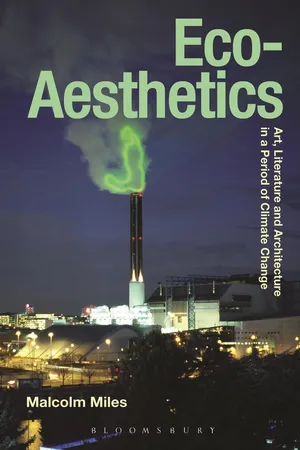
Eco-Aesthetics
Art, Literature and Architecture in a Period of Climate Change
- 256 pages
- English
- PDF
- Available on iOS & Android
About this book
By moving beyond traditional aesthetic categories (beauty, the sublime, the religious), Eco-Aesthetics takes an inter-disciplinary approach bridging the arts, humanities and social sciences and explores what aesthetics might mean in the 21st century. It is one in a series of new, radical aesthetics promoting debate, confronting convention and formulating alternative ways of thinking about art practice. There is no doubt that the social and environmental spheres are interconnected but can art and artists really make a difference to the global environmental crisis? Can art practice meaningfully contribute to the development of sustainable lifestyles? Malcolm Miles explores the strands of eco-art, eco-aesthetics and contemporary aesthetic theories, offering timely critiques of consumerism and globalisation and, ultimately, offers a possible formulation of an engaged eco-aesthetic for the early 21st century.
Frequently asked questions
- Essential is ideal for learners and professionals who enjoy exploring a wide range of subjects. Access the Essential Library with 800,000+ trusted titles and best-sellers across business, personal growth, and the humanities. Includes unlimited reading time and Standard Read Aloud voice.
- Complete: Perfect for advanced learners and researchers needing full, unrestricted access. Unlock 1.4M+ books across hundreds of subjects, including academic and specialized titles. The Complete Plan also includes advanced features like Premium Read Aloud and Research Assistant.
Please note we cannot support devices running on iOS 13 and Android 7 or earlier. Learn more about using the app.
Information
Table of contents
- Cover
- Contents
- List of illustrations
- Preface
- Acknowledgements
- Introduction
- 1 Climate Change and Culture
- 2 Ecologies
- 3 Aesthetics
- 4 Ruins and Catastrophes
- 5 Regressions and Reclamations
- 6 Representations
- 7 Interruptions
- 8 Cultures and Climate Change
- Notes